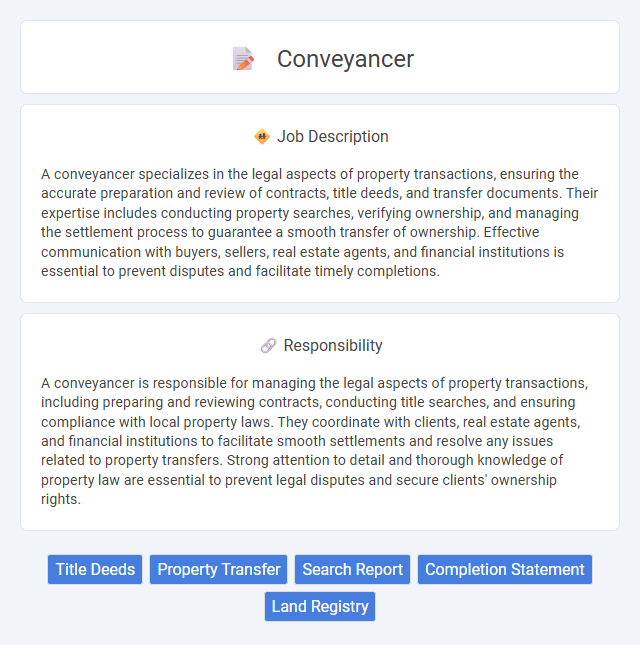
A conveyancer specializes in the legal aspects of property transactions, ensuring the accurate preparation and review of contracts, title deeds, and transfer documents. Their expertise includes conducting property searches, verifying ownership, and managing the settlement process to guarantee a smooth transfer of ownership. Effective communication with buyers, sellers, real estate agents, and financial institutions is essential to prevent disputes and facilitate timely completions.
Individuals with strong attention to detail and excellent organizational skills are likely suitable for a conveyancer job, as the role demands precise handling of legal documents related to property transactions. Those possessing good communication abilities and a methodical approach may find the position aligns well with their strengths, enabling smooth coordination between clients, solicitors, and real estate agents. People who prefer structured tasks and can manage deadlines effectively probably have a higher chance of thriving in this profession.
Qualification
A qualified conveyancer typically holds a diploma or certificate in conveyancing, real estate, or law, ensuring in-depth knowledge of property transfer processes. Professional accreditation from recognized bodies like the Council for Licensed Conveyancers (CLC) is essential to practice legally and ethically. Expertise in property law, contract preparation, and client liaison enhances their ability to manage complex property transactions efficiently.
Responsibility
A conveyancer is responsible for managing the legal aspects of property transactions, including preparing and reviewing contracts, conducting title searches, and ensuring compliance with local property laws. They coordinate with clients, real estate agents, and financial institutions to facilitate smooth settlements and resolve any issues related to property transfers. Strong attention to detail and thorough knowledge of property law are essential to prevent legal disputes and secure clients' ownership rights.
Benefit
Working as a conveyancer is likely to offer the benefit of steady demand due to the continuous need for property transactions, enhancing job security. The role may provide opportunities to develop specialized expertise in real estate law and contracts, potentially increasing career growth prospects. Flexibility in work settings, including possibilities for remote work or self-employment, could also contribute positively to job satisfaction and work-life balance.
Challenge
Navigating complex legal documents and property laws poses a significant challenge for conveyancers, requiring meticulous attention to detail and a deep understanding of regulations. The probability of encountering unexpected issues during property transactions demands strong problem-solving skills and adaptability. Managing tight deadlines and coordinating between multiple parties may further complicate the conveyancing process.
Career Advancement
A conveyancer plays a crucial role in property transactions by preparing and reviewing legal documents, ensuring smooth title transfers, and resolving any issues related to land ownership. Career advancement in conveyancing can lead to senior roles such as conveyancing manager or legal executive, where individuals oversee complex transactions and manage teams. Gaining certifications from recognized bodies like the Council for Licensed Conveyancers enhances credibility and opens opportunities for higher responsibility and specialized areas such as commercial property conveyancing.
Key Terms
Title Deeds
A conveyancer specializes in the legal process of transferring property ownership, focusing on verifying and managing Title Deeds to ensure accurate and lawful transactions. They conduct thorough searches and investigations on Title Deeds to confirm the seller's ownership and identify any restrictions, covenants, or liens affecting the property. Expertise in Title Deeds helps prevent legal disputes and secures a clear title for buyers during property conveyancing.
Property Transfer
A conveyancer specializes in the legal aspects of property transfer, ensuring all documentation such as contracts, title searches, and settlement statements are accurately prepared and reviewed. They coordinate with buyers, sellers, real estate agents, and financial institutions to facilitate smooth ownership transfer while managing compliance with local property laws and regulations. Their expertise reduces risks of disputes or delays during the conveyancing process, safeguarding clients' interests in property transactions.
Search Report
A Conveyancer plays a critical role in property transactions by preparing the Search Report, which includes important searches such as local authority, environmental, and drainage reports. This comprehensive Search Report helps identify potential legal and physical risks affecting the property, ensuring clients make informed decisions. Accurate interpretation and presentation of these reports safeguard buyers and sellers during the conveyancing process.
Completion Statement
A conveyancer prepares the Completion Statement to provide a detailed financial summary of a property transaction, outlining costs such as purchase price, deposits, legal fees, and taxes. This critical document ensures transparency and accuracy for both buyers and sellers, aiding in the finalization of the sale. Accurate Completion Statements minimize disputes and facilitate smooth fund transfers during property settlements.
Land Registry
A conveyancer specializing in Land Registry ensures the accurate transfer of property titles and updates land records in compliance with legal requirements. Expertise in Land Registry procedures, including preparing and submitting official documents, reduces the risk of disputes and ensures smooth property transactions. Mastery of Land Registry systems streamlines ownership verification and secures clients' property rights.
 kuljobs.com
kuljobs.com